The MBA 590 Capstone course must be taken only after all other courses in the program have been completed.
Summer term 1 begins. Apply by April 23, 2026.
Summer term 2 begins. Apply by June 18, 2026.
Fall term 1 begins. Apply by Aug. 13.
Unlock Your Financial Leadership Potential
Transform your career trajectory with Champlain College Online's Master's in Accounting. Our comprehensive program blends advanced accounting principles with cutting-edge technology integration, preparing you to excel in today's data-driven financial landscape. Whether you're aiming to progress in public accounting, corporate finance, or pursue an advanced accounting CPA certification, our accredited online program delivers the expertise and credentials employers demand.
Advance Your Financial Expertise Through Innovation and Excellence
- Advanced Accounting Mastery: Develop expertise in financial reporting, auditing techniques, and forensic accounting methodologies that meet today's complex business needs.
- Technology Integration: Learn to leverage AI, blockchain, and cloud computing in accounting processes, positioning you at the forefront of financial technology innovation.
- Certification Preparation: Gain the educational requirements and knowledge foundation necessary for professional certifications, including CPA, CMA, CFP, and CIA credentials.
- Real-World Application: Apply accounting principles through case studies and projects that simulate challenges faced by accounting professionals in various industries.
- Flexible Online Format: Complete your master's degree in accounting entirely online with course structures designed for working professionals.
- Specialized Focus Options: In addition to advanced accounting knowledge, this master of science degree incorporates your choice of an area of specialization via a graduate certificate. Choices are: Business Analytics, Cybersecurity, Finance, Healthcare Administration, Project Management, or Public Administration. See the program curriculum section for details.
Our program prepares graduates for various roles in the accounting field, ensuring you are well-equipped to advance your career in today's competitive job market.
Program Curriculum
Champlain's online accounting courses encompass the top skills needed by today's business professionals.
Professional Courses (21 Credits)
Graduate Certificate (9 Credits)
Advances your understanding of how to use financial information to value and analyze firms. Uses an understanding of a firm's strategy, what is contained in financial reports, why firms report certain information, and how to be a sophisticated user of this information. Evaluates current performance and its future sustainability, forecasts future profitability and risk, and values businesses using earnings and book value data. Develops a foundation to effectively communicate financial information.
This course prepares accounting students to evaluate performance, design control systems, and manage risk through a strategic lens. Students learn to apply tools such as the Balanced Scorecard, KPIs, KRIs, and scenario analysis to support decision-making. Emphasis is placed on aligning metrics with strategy, communicating financial risk, and developing professional judgment as a forward-thinking advisor.
Examines major international dimensions of financial and managerial accounting. Discusses national and cultural influences on accounting and on the accounting profession. Investigates financial regulation and IFRS accounting and financial reporting standards. Investigates corporate decisions related to methods of currency translation and accounting for gains and losses from exchange rate fluctuations. Explores managerial accounting issues raised by international organizations.
Students will explore how technologies like cloud computing, blockchain, and non-generative Artificial Intelligence (AI) are revolutionizing the field of accounting by automating accounting processes, enhancing accuracy and efficiency in financial reporting, and ensuring compliance with evolving regulations. The course also addresses critical issues like cybersecurity, data privacy, and ethical considerations specific to the accounting profession. Future trends will also be explored.
Focuses on complex frauds (including financial statement fraud, tax fraud and money laundering), and on non-fraud forensic accounting engagements (including cases of patent infringement, commercial damages and anti-trust.) Covers related investigation methods and legal issues, valuation models, reporting and communicating findings, testifying as an expert witness and other litigation advisory services.
Students will focus on the application of technologies in auditing and how the technologies change the audit processes and the audit profession. The course covers data-driven audit methods, the use of AI and machine learning in the audit processes.
This course is built around a project that is designed to apply, in a comprehensive manner, the core areas of knowledge around which the MBA has been built. The project may be performed for a current employer, a sponsoring workplace or as an internship as either a service-learning project for a qualifying nonprofit organization or another organization of the student's choosing.
Prerequisites
This course covers the foundations of Data Management for Business Analytics. Students examine and explore the value of information, as an asset and as a liability, and organize and assess its value in an information- driven organization dealing with the challenges of Big Data, Open Data and privacy protection legislation.
Students learn to create powerful reporting tools, to forecast data behavior, and to explore its use in business. This class has a hands-on approach, developed in the context of the application of analytics to business, allowing students to develop the skills necessary to create relevant tools for data-driven organizations. All hands-on work assumes the existence of a technology infrastructure, and no prior knowledge on how to install or maintain the software used in the labs is required.
Students apply the business analytics skills to specific business areas. Students will explore techniques and develop tools that model consumer behavior, supply and demand, and financial performance, in order to predict data evolution in different conflicting scenarios. Students will also apply business analytics to HR decision making such as recruiting, performance measurement, or compensation.
In this course, students examine essential cybersecurity concepts in the context of different business environments. Students explore a range of topics, including risk, vulnerabilities, security architecture and design, identity and access management, and incident response.
In this course, students learn about threat actors, and threat intelligence collection, analysis, and dissemination. Students also learn how to analyze cyber threats and develop effective countermeasures and examine the legal and ethical implications of threat intelligence gathering and sharing.
Prerequisites
Take OPSC-506
In this course, students learn how to develop and implement effective cybersecurity policies and procedures, and study legal and regulatory requirements in cybersecurity, including data protection laws and standards. Students also learn how to align cybersecurity strategies with business objectives.
Prerequisites
Take OPSC-506
Students explore organizational finance with emphasis on investments, financial health, and corporate finance. Through practical application, accurate real-world simulations, and situational analyses, students build a grounding in finance in preparation for more advanced courses in the finance program.
In this course, students will explore the pivotal concepts of corporate finance and their application in contemporary business settings, as well as the intricacies of the capital structure of publicly traded companies, the principles that guide valuation, the investments made by these corporations, and the rationale behind such financial decisions.
Prerequisites
Take FINC-501
In this course, students will embark on a comprehensive exploration of investment theories and practices. The course provides students with a theoretical grounding for investments and teaches them about important issues that all investors need to consider, such as the economy, valuing securities, different types of assets, and the subtleties of modern portfolio theory.
Prerequisites
Take FINC-501
Students learn about the U.S. health care system, including the government's role in the industry, cost and quality issues, managed care, reimbursement mechanisms, legal and regulatory issues, profit vs. non-profit care, the role of technology, and then compare it to international health care systems. Students will begin to conceptualize new models of delivery through analysis of barriers to process improvement and the use of design thinking and analytics. Students will appraise development, implementation and management of system components.
Managing information as a strategic resource is challenging. Students will design IT systems to capture, combine, and transform data into information to measure processes/outcomes of care, support clinical decision-making and management decisions, empower patients, and improve health care operations. Students explore health information systems within the context of associated business processes to develop innovative solutions. Management of change as related to clinical systems will also be stressed to help build buy-in, engage individuals and ultimately improve workflow and system design.
Prerequisites
Complete HCMT-515 concurrently or prior to HCMT-523
Students learn to apply elements of regulation, law and ethics to the administrative process in a variety of healthcare settings and situations. Healthcare administrators can avoid many legal disputes by understanding basic concepts such as patient rights, informed consent and privacy regulations. Course themes include the legal barriers that interfere with process improvement, malpractice, and the limits on sharing information across institutions. Students analyze recent legal developments, including the Affordable Care Act, medical marijuana, and right to die legislation.
Prerequisites
Complete HCMT-515 concurrently or prior to HCMT-535.
This course is designed to introduce a systematic process for planning, organizing and controlling projects. The course will present a practical methodology for completing projects more quickly with fewer problems. Student work will consist of readings, research, class special-topic presentations, group activities, a project management journal, and participation in a real world IT business project. Students will be encouraged to apply project-management techniques to solve existing real-world technology-related business problems.
In this course, students study Agile project management methodologies, in the context of software development, as a way of achieving Software Engineering quality goals. Students will learn what projects lend themselves to an agile approach, and how the agile approach relates to traditional project management, while learning the tools and techniques of Agile.
In this course, students will explore project uses of accounting and financial information and the development and use of project cost accounts. An introduction to common cost engineering principles, financial systems, and conventions will enable students to develop and evaluate project budgets. In addition, students will learn techniques to integrate resources, schedules, and cost estimates throughout the life of the project to predict and manage cost performance.
Prerequisites
Complete PMGT-510
In this course students will focus on the key theories, practices, and trends in public administration. Topics include the historical development of public administration in the United States, politics of political institutions, management, leading in public administration, key roles and functions of public administration, organizational structure of government organizations, analysis of key public administration theories, understanding bureaucracy and its role, public administration reforms, and future trends.
In this course, students will focus on the methodology for analyzing, developing, and implementing public policy. Topics include types of public policies, understanding the policy-making process, analyzing public policies, impact analysis of public policies, understanding the role of stakeholders in public policy, economic, social, and political factors influencing policy, and case studies in public policy analysis.
Students will examine public budgeting processes, financial management principles, and fiscal decision-making specific to the public sector. Topics include: the public budgeting process: formulation, execution, and auditing; revenue generation and sources of public funds; expenditure management and cost control; financial planning and forecasting; accountability and transparency; and the evaluation of case studies in public budgeting and financial management.
Additional Program Details
Graduates of the master of accounting online program will demonstrate the following industry-specific skills, knowledge, and competencies:
- Interpret financial information and integrate that information, using relevant technologies where appropriate to support decision making by internal and external stakeholders.
- Assess an organization’s accounting and IT internal controls to ensure the management and protection of sound financial information, reduce financial risks, and meet strategic goals.
- Communicate financial information that promotes sound financial decision making.
- Merge traditional accounting practices with technological tools to enhance financial decision-making, reporting, and auditing.
Our admissions team seeks to admit students who:
- Hold a bachelor's degree from a regionally accredited institution.
- Demonstrate a solid academic foundation - a minimum 2.5 GPA is our recommendation, though exceptions may be made on a case-by-case basis for those who demonstrate a potential for academic success in other ways.
- Possess an aptitude for success in an online learning environment.
- Exhibit the ability to make a positive contribution to the Champlain College Online community.
- The GMAT and/or GRE are NOT required for admission into a Champlain online graduate program.
To learn more about submitting transcripts, or requirements for those educated abroad or returning students visit our graduate Admissions page.
Our transfer credit evaluation team works hard to ensure you get the transfer credits you deserve, from a variety of sources including prior college credits, work experience and training, military training and experience, and more. Our goal is to help you graduate from Champlain College Online as quickly and affordably as possible. Visit our Transfer Credit Options page to learn more.
Champlain College Online's business faculty, led by Department Chair Dr. Elaine Young, are expert practitioners in the field. Their industry expertise ensures that our business management curriculum is aligned with the needs of employers, and reflects the skills today’s business professionals need for success. Classes led by our seasoned experts will give you real-world insight into the business world, and create a rich community of career-focused learning.
Tuition & Costs
Graduate Tuition Fall '25 - Summer '26
Tuition & Costs
Graduate Tuition Fall '26 - Summer '27
See the graduate cost of attendance and fees here
* Alumni is defined, for this tuition rate, as any degree program graduate from Champlain College or Champlain College Online.
** Veteran rate effective Spring 2025, not retroactive
Affordability and Paying For Your Education
We provide a number of options to make your online education affordable, including preferred tuition for alumni, associate degree graduates, community college graduates, and military.
How can an MS in Accounting Help Your Career?
According to the Bureau of Labor Statistics, employment of accountants and auditors is projected to grow 4% from 2022 to 2032, with a median annual wage of $78,000*. Financial managers, a typical career path for accounting master's graduates, can expect even stronger growth, at 16%, with median annual earnings of $139,790*.
Graduates of our MS in Accounting program are well-prepared to pursue professional certifications such as CPA, CMA, and CIA to enhance career prospects, validate expertise, and demonstrate a commitment to the highest standards in the accounting profession.
*Source: Bureau of Labor Statistics (BLS), 2025
Top Jobs for MS in Accounting Graduates
- Financial Analyst
- Forensic Accountant
- Financial Controller
- Financial Risk Manager
- Chief Financial Officer

Why Champlain
Online Experience
"I was 100% certain I would only do my bachelor's, but great advising led me to apply for the master's program. Going back to school helped me pursue further dreams and eventually be promoted, and gave me confidence in my own abilities and skillset."

Academic Excellence and Recognition

Regionally accredited by the New England Commission of Higher Education

Designated as a Military Friendly School for our commitment to the military community
Ranked among the best by Tech Guide for game design and computer science

Named the among the best schools with accelerated bachelor's degrees by Intelligent.com
Meet the Program Director
Elaine Young, PhD
- Accounting (Certificates, A.S., B.S., M.S.)
- Analytics (Certificates, M.S. Programs)
- Business (Certificates, A.S.,B.S.,MBA)
- Digital Marketing (B.S.)
- Digital Marketing and Technology (M.S.)
- Digital Media (B.S.)
- Esports Management (B.S.)
- Finance (Certificates, A.S., B.S.)
- Healthcare (all programs)
- Human Resource Management
- Leadership (Organizational and Digital Transformation)
- Management Information Systems
- Marketing (M.S.)
- Marketing Analytics (M.S.)
- Marketing & Communication (B.S.)
- Marketing Management (B.S.)
- Positive Organization Development Certificate
- Positive Organizational Psychology & Development
- Project Management
- Public Administration
About
Dr. Elaine Young is the Program Director for all business programs, and Curriculum Innovation Faculty Lead, at Champlain College Online.
As chair, Dr. Young manages the faculty, curriculum, and assessment for undergraduate and graduate programs in the business programs as well as developing and teaching courses. As Curriculum Innovation Faculty Lead, Dr. Young supports creation of new curriculum offerings that serve both the needs of adults continuing their education and employers who need educational opportunities for their employees. Prior to her leadership role at Champlain College Online, Dr. Young has been part of the Champlain College community since 2000 as a professor and faculty advisor for traditional on-campus students. She is a HubSpot Educator and a Certified Appreciative Advisor.
Dr. Young has a Ph.D. in Organizational Management from Capella University, where her dissertation research examined technology use and adoption of college students. In addition, she holds an M.S. in Internet Strategy Management from Marlboro College, a B.S. in Communication and Public Relations from SUNY Brockport and an A.S. in Communication from Genesee Community College. Dr. Young has over ten years of experience in the Marketing and Public Affairs profession, specializing in nonprofits. She is the author of “Tuned-in Family: How to Cope, Communicate and Connect in a Digital World” (2014).

FAQs: Master’s in Accounting Online
On average, students in Champlain College Online’s master’s in accounting program take 10 months to complete the program. This timeline accounts for enrollment in two courses per term. Our master’s in accounting program is available online in a flexible format, allowing you to complete your graduate degree at a pace that suits you.
In today’s increasingly data-driven world, a master’s in accounting is a worthwhile investment for those interested in a career in accounting or finance. Champlain College Online’s accredited program equips you with a mastery of accounting and prepares you to pursue an advanced accounting CPA certification.
A master’s in accounting offers a comprehensive examination of accounting principles, with a curriculum that encompasses topics such as auditing, forensic accounting, risk assessment, and business analytics. An MBA in Accounting will also cover these topics, albeit with a more limited scope. It will also cover more general business principles and practices, such as digital marketing, organizational strategy, and negotiation. Those who are sure their career path leads to an accounting role would likely be better suited to the master’s in accounting. Individuals interested in a business career that may involve some accounting tasks may find the broader scope of the MBA more worthwhile.
You May Also Be Interested In
Get Your MS Accounting Guide
Learn what you can expect from our online MS of Accounting program.

Download Program Guide
I acknowledge that, by clicking the "submit" button, I am giving my express written consent to Champlain College and its representatives to contact me about educational opportunities via email, text, or phone, at the phone number above, including my mobile phone, using an automatic dialer, or pre-recorded message. Message and data rates may apply. I understand that my consent is not a requirement for enrollment, and I may withdraw my consent at any time.






